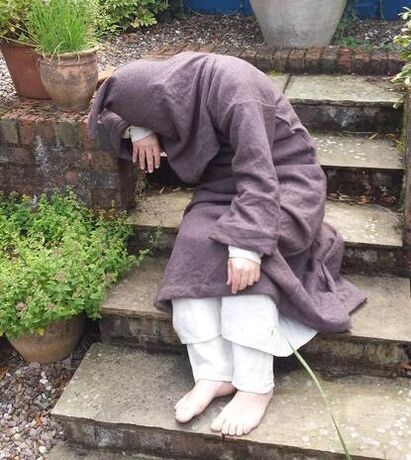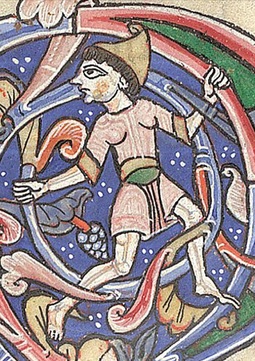Growing up as a kid in the 1970s, I remember reading in my copy of Your Youth (published by the Jehovah’s Witnesses) that 90% of boys masturbated, whilst only 50% of girls did so. It made me think at the time that boys were somehow ‘dirtier’ than girls, and inevitably prone to sexual sin!
So when a few years ago I came across the writing of the Benedictine monk and school-master Ælfric Bata (great name), I was somewhat surprised to see that this perception of boys had actually been spoken about a thousand years ago. Bata’s Colloquies, or ‘conversations’, were compiled into a schoolbook designed to teach young students the art of communicating in Latin. But they turn out to be much more than that. Though clearly not documented ‘real life’ – they in fact read like dramatic spoofs – I would argue, nevertheless, that these conversations reveal Bata’s observations on the sexual dynamics in the all-male environment of Anglo-Saxon monasteries. The strict code of purity and temperance, propounded tirelessly by Bata’s own tutor, the rather grave Ælfric of Eynsham, is often a target of jest in Bata’s skits. Both students and masters are seen to constantly flout the regulations set out in the Benedictine rules for monks, known as the Regularis Concordia. Though the skits do not attack monastic principles per se, there is much within that may be read as mocking the performance of those whose duty it was to live the spiritual life. In the final conversation (Colloquy 29), however, a strict and moralizing tone is suddenly adopted. The Father exhorts his spiritual sons to a chaste and upright life, and is heard opining the naughtiness of boys: "For that reason I’ve written and arranged these speeches in my own way for you young men, knowing that boys speaking to one another in their way more often say words that are playful than honorable or wise, because their age always draws them to foolish speech, frequent joking, and naughty chattering." Earlier, the master had acknowledged the educational value of mixing ‘jokes’ with ‘wise words and sayings’, but here he asserts that boys have a tendency by themselves towards unseemly chatter. This propensity for indecent speech may have been perceived by Bata as just one facet of a typically boyish predisposition towards sexual naughtiness, something provocatively suggested in two of the preceding conversations. In Colloquy 25, a conversation full of outrageous scatological insults (master and student basically end up calling each other a piece of shit), the student is derided by the master as a ‘fox cub’, a ‘fox tail’, and ‘a little fox, the seed of a demon’! He is accused of ‘flattering and seducing’ the other boys, ‘leading them into bad behavior and deceitfully inviting them toward twisted deeds’. As the editor of Bata’s text points out, in medieval medicine the fox’s tail was seen as providing a stimulus for sexual intercourse. Its use as an epithet for the boy implies that his seducing of other boys towards twisted deeds was at least partly sexual in nature; and this is further underscored by the master’s sexualizing designation of the boy as 'semen demonis', literally, a demon’s semen. The sexual waywardness of male youth is also insinuated in Colloquy 9, where the bawdy euphemism of the ‘little brother’ with ‘beautifully long and curly hair’ betrays his predilection for sexual depravity. First, the boy is urged by his master to acquiesce to a fellow brother’s wish to be accompanied to the toilet. The boy is admonished to take care of ‘everything for him in the latrine’, prepare him for bed, and to ‘obey him in every way’. These activities clearly flouted the monastic rules: a monk taking a young boy alone ‘for any private purpose’ was strictly forbidden. It is this particular contravention, with its strong sexual overtones, that serves as the backdrop for the boy’s intoxicated speech once he returns from his errands and is rewarded with alcohol: “I want to drink from the horn. I ought to have the horn, to hold the horn. I’m called horn! Horn is my name! I want to live with the horn, to lie with the horn and sleep, to sail, ride, walk, work and play with the horn. All my kith and kin had horns and drank. And I want to die with the horn! Let them have the horn, those who are filling it and are about to give it to me! Now I have the horn. I’m drinking from the horn. Have every good thing, and let’s all be happy and drink from the horn!" One might insist on reading this passage as referring to nothing more than the boy’s desire to be constantly availed of a drinking horn (and, of course, it’s clear that this passage would have been a brilliant lesson for verb conjugation and noun declensions, zzzzzzzzzz), but it is not difficult to appreciate its sexual innuendo. And we can look to none other than the great Saint Isidore of Seville for support in this. In his seventh-century Etymologiae, a well-known encyclopaedia in Anglo-Saxon England, Isidore observes the licentious, bacchanalian significance of the horn. He notes that Liber (another name for Bacchus) holds both a horn and a vine garland ‘because when wine is drunk willingly and in measure it brings happiness’; and, pertinently, that through Liber ‘men are freed by sex through his agency when their sperm is released’. This association of the horn with inebriated, ejaculative sex led one scholar, David Clark, to conclude that Bata’s choice of horn ‘playfully associates the drinking of alcohol with oral sex’. I would suggest that the boy’s declaration of his various intentions towards the horn may well infer a rather larger range of inter-male activities! When I think back to my own sexual education, such as it was, I wonder now if the masturbation statistics cited were really accurate, or did their inclusion in my Youth book simply reflect a long held notion that boys are just naughtier than girls. As I hope I’ve made clear, Bata’s words certainly suggest that this notion has been around for some time. Now, before I get back to my solitary monkish musings, I have just one more thing to say about Bata and his book. In a final admonishment directed to his schoolboys, he urges them to ‘desist forthwith from all vulgar songs and allurements’. Master Bata! Isn't that simply a case of closing the stable door after the horse has bolted! (I couldn't think of a more obvious euphemism, apologies.) I think we are going to have to conclude that Ælfric Bata was a bit of a dodgy schoolmaster, with a bit of a dodgy past. For despite his Johnny-cum-lately protestations, he didn’t hesitate in the first place to include in a schoolbook a skit with an especially vulgar paean to the male member – uttered, of course, by a naughty boy.
6 Comments
Huscarl 1067
31/10/2014 06:20:24 am
It's rather strange that the age of consent has been increased to 14 in the Vatican. How many women live there.
Reply
Chris (the Anglo-Saxon Monk)
31/10/2014 09:11:27 am
Thanks @Huscarl1067 for you comment. This piece of information had escaped my notice. I understand Vatican City increased its age of consent for both sexes to 18, unless you are married, in which case a husband can be 16 and a wife 14 (they have to have sex with their spouse). The move by the Pope was apparently by way of curbing child abuse. It seems a bit of a fudge to me.
Reply
Leave a Reply. |
Details
|


